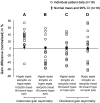Static ocular counterroll reflex in skew deviation
- PMID: 21813791
- PMCID: PMC3159094
- DOI: 10.1212/WNL.0b013e3182299f71
Static ocular counterroll reflex in skew deviation
Abstract
Objective: The static ocular counterroll (OCR) reflex generates partially compensatory torsional eye movements during head roll. It is mediated by the utricle in the inner ear. Skew deviation is a vertical strabismus thought to be caused by imbalance in the utriculo-ocular pathway. We hypothesized that if skew deviation is indeed caused by damage to this reflex pathway, patients with skew deviation would show abnormal OCR.
Methods: Eighteen patients with skew deviation caused by brainstem or cerebellar lesions and 18 normal participants viewed a target at 1 m. Ocular responses to static passive head roll-tilts of approximately 20° were recorded using search coils. Static OCR gain was calculated as the change in torsional eye position divided by the change in head position during sustained head roll. Perception of the subjective visual vertical (SVV) was also measured.
Results: Group mean OCR gain was reduced by 45% in patients. At an individual level, OCR gains were asymmetric between eyes and between torsional directions in 90% of patients. In addition, the hypotropic eye incyclotorting gain was lower than the hypertropic eye excyclotorting gain during head roll toward the hypotropic eye in 94% of patients. No consistent pattern of gain asymmetry was found during head roll toward the hypertropic eye. The SVV was tilted toward the hypotropic eye.
Conclusion: Static OCR gain is significantly reduced in skew deviation. Interocular and directional gain asymmetries are also prevalent. The asymmetries provide further evidence that disruption of the utriculo-ocular pathway is a mechanism for skew deviation.
Figures



References
-
- Smith JL, David NJ, Klintworth G. Skew deviation. Neurology 1964;14:96–105 - PubMed
-
- Keane JR. Ocular skew deviation: analysis of 100 cases. Arch Neurol 1975;32:185–190 - PubMed
-
- Brandt T, Dieterich M. Skew deviation with ocular torsion: a vestibular brainstem sign of topographic diagnostic value. Ann Neurol 1993;33:528–534 - PubMed
-
- Brodsky MC, Donahue SP, Vaphiades M, Brandt T. Skew deviation revisited. Surv Ophthalmol 2006;51:105–128 - PubMed
-
- Wong AM, Sharpe JA. Cerebellar skew deviation and the torsional vestibulo-ocular reflex. Neurology 2005;65:412–419 - PubMed
Publication types
MeSH terms
Grants and funding
LinkOut - more resources
Full Text Sources
Medical
